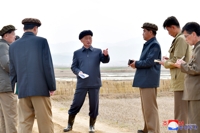(EDITORIAL from Korea Times on Feb. 27)
Boon or bane?
Time to sharpen competitiveness over China trade deal
Seoul and Beijing have signed their provisional free trade agreement three months after the neighboring countries concluded their negotiations.
There have been no major changes from the agreement in November, when the negotiations were concluded, but some new elements have been added.
First of all, 310 products from the inter-Korean joint industrial park in Gaeseong, North Korea, will immediately benefit from reductions or eliminations for China's import tariffs. This seems epoch-making, considering that only 100 products are subject to these benefits in Korea's free trade deals with Peru and the Association of Southeast Asian Nations (ASEAN).
Korean travel agencies will also be able to recruit tourists in China directly. Moreover, Seoul and Beijing have agreed to provide preferential treatment to financial firms when entering each other's markets.
Under the deal, Korea will eliminate tariffs on 92 percent of all goods imported from China within the next 20 years. China will scrap tariffs on 91 percent of items imported from Korea within the same period. This is certainly a low level of market opening, given that trade accords with the United States and the European Union envisioned cutting or removing tariffs within three years.
All this reflects the governments' practical considerations. Seoul hoped to exclude rice, its main staple food, from negotiations from the beginning, and hundreds of agricultural and fisheries products are not subject to market liberalization. Beijing, for its part, succeeded in protecting its automobile and other manufactured goods markets.
Even so, implications from the China deal are huge, given the scale of bilateral trade and geographical proximity, as well as their close political and security relationship. The agreement can be a boon for our sagging economy, but it may turn into a bane at any time unless addressed properly.
The deal makes Korea the only major economy in the world to sign a free trade agreement with the world's three largest economies ― the U.S., China and the European Union. The Seoul government expects the pact to help Korean businesses explore China's huge domestic markets more actively at a time when Korea is mired in a prolonged economic slump.
But the risks will be far greater. China, the world's second-largest economy, is certainly formidable in all aspects ― capital strength, technical expertise and population.
A case in point is China's recent accumulation of technology in smartphones. It's no secret that Xiaomi and other Chinese handset makers have been intensely catching up with our smartphone flagships such as Samsung and LG.
All this explains why our government and businesses should do their utmost to put top priority on sharpening competitiveness. This is badly needed in order to translate into practice the government's wish to use the China deal as an occasion for another take-off for the Korean economy.
To this end, the government should craft a precise support system so that businesses can explore China's markets more effectively. It's needless to say that the National Assembly should quicken the process of ratifying the trade pact so that our companies can benefit from the deal at an early date.
(END)
-
 Defense chief says N. Korea's hypersonic missile 'unsuccessful' in last-stage glide flight
Defense chief says N. Korea's hypersonic missile 'unsuccessful' in last-stage glide flight -
 Relax, immerse yourself in scents at Venice Biennale's Korean Pavilion
Relax, immerse yourself in scents at Venice Biennale's Korean Pavilion -
 Overdue debut of Korean abstract art pioneer Yoo Young-kuk at Venice Biennale
Overdue debut of Korean abstract art pioneer Yoo Young-kuk at Venice Biennale -
 N. Korea has capability to genetically engineer biological military products: U.S. report
N. Korea has capability to genetically engineer biological military products: U.S. report -
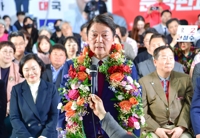 PPP lawmaker says entire Cabinet should resign over general elections defeat
PPP lawmaker says entire Cabinet should resign over general elections defeat
-
 Relax, immerse yourself in scents at Venice Biennale's Korean Pavilion
Relax, immerse yourself in scents at Venice Biennale's Korean Pavilion -
 Overdue debut of Korean abstract art pioneer Yoo Young-kuk at Venice Biennale
Overdue debut of Korean abstract art pioneer Yoo Young-kuk at Venice Biennale -
 Defense chief says N. Korea's hypersonic missile 'unsuccessful' in last-stage glide flight
Defense chief says N. Korea's hypersonic missile 'unsuccessful' in last-stage glide flight -
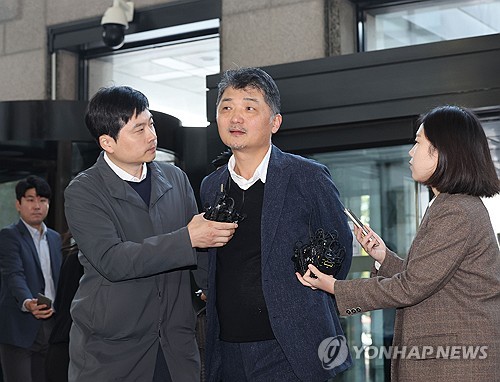 Questioning necessary for Kakao founder for suspected stock rigging: prosecution
Questioning necessary for Kakao founder for suspected stock rigging: prosecution -
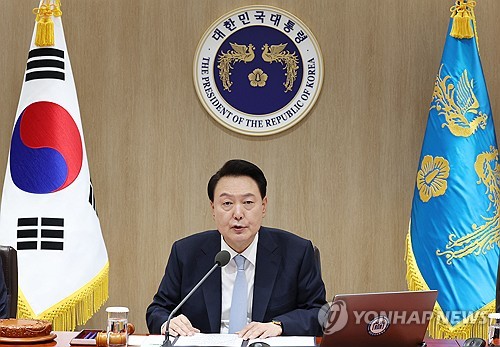 (LEAD) Yoon vows to improve communication with people after election defeat
(LEAD) Yoon vows to improve communication with people after election defeat
-
 S. Korea to provide 100,000 tons of rice to 11 nations
S. Korea to provide 100,000 tons of rice to 11 nations -
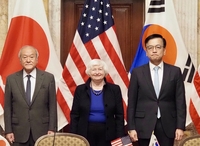 (4th LD) Finance chiefs of S. Korea, U.S., Japan recognize 'serious' concerns over 'sharp' won, yen depreciation
(4th LD) Finance chiefs of S. Korea, U.S., Japan recognize 'serious' concerns over 'sharp' won, yen depreciation -
 Facebook page unveils photos of BTS member V in counter-terrorism unit gear
Facebook page unveils photos of BTS member V in counter-terrorism unit gear -
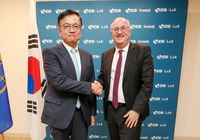 S. Korea to provide US$200 million in humanitarian aid to Ukraine this year
S. Korea to provide US$200 million in humanitarian aid to Ukraine this year -
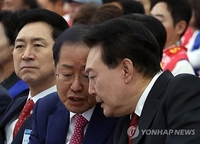 Yoon, Daegu mayor met to discuss post-election matters: sources
Yoon, Daegu mayor met to discuss post-election matters: sources















